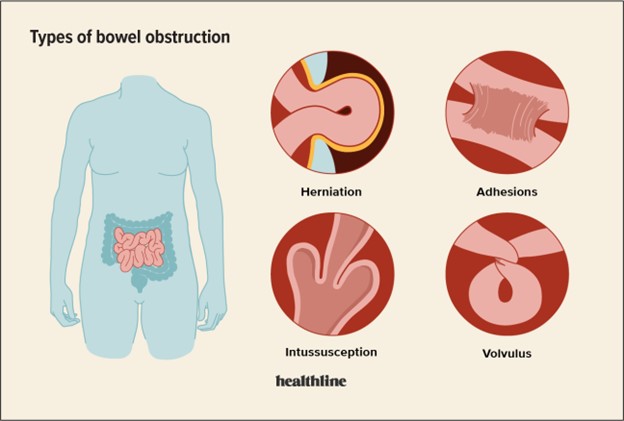A client arrives to the emergency department complaining of acute onset of nausea with projectile vomiting. The nurse's assessment findings include high-pitched sounds in the left upper quadrant. Which gastrointestinal disorder is consistent with these findings?
Colorectal cancer
Paralytic ileus
Large bowel obstruction
Small bowel obstruction
The Correct Answer is D
Choice A Reason: Colorectal cancer is not likely to cause nausea with projectile vomiting or high-pitched sounds in the left upper quadrant. Colorectal cancer may cause symptoms such as rectal bleeding, change in bowel habits, abdominal pain, or weight loss.
Choice B Reason: Paralytic ileus is a condition where the bowel stops working and does not contract or move food along. Paralytic ileus may cause symptoms such as abdominal distension, absence of bowel sounds, constipation, or vomiting.
Choice C Reason: Large bowel obstruction is a blockage of the colon or rectum that prevents the passage of stool. Large bowel obstruction may cause symptoms such as abdominal distension, low-pitched sounds in the right lower quadrant, constipation, or ribbon-like stools.
Choice D Reason: Small bowel obstruction is a blockage of the small intestine that prevents the passage of food and fluids. Small bowel obstruction may cause symptoms such as nausea with projectile vomiting, high-pitched sounds in the left upper quadrant, abdominal cramps, or dehydration.

Nursing Test Bank
Naxlex Comprehensive Predictor Exams
Related Questions
Correct Answer is C
Explanation
Choice A Reason: Seasonal allergies are not a cause of delirium, but a common condition that affects the respiratory system and causes symptoms such as sneezing, runny nose, itchy eyes, or coughing.
Choice B Reason: History of GERD is not a cause of delirium, but a chronic condition that affects the digestive system and causes symptoms such as heartburn, regurgitation, chest pain, or difficulty swallowing.
Choice C Reason: Benzodiazepines are a cause of delirium, especially in older adults or those with cognitive impairment. Benzodiazepines are a class of drugs that act on the central nervous system and cause sedation, relaxation, and reduced anxiety. However, they can also impair memory, attention, orientation, and judgment, and lead to confusion, agitation, hallucinations, or delusions.
Choice D Reason: Completed antibiotics 10 days ago are not a cause of delirium, but a treatment for bacterial infections. Antibiotics can have side effects such as nausea, diarrhea, rash, or allergic reactions, but they do not cause delirium unless they are toxic or interact with other medications.
Correct Answer is A
Explanation
Choice A reason: This is correct because hearing loss is the most common complaint associated with a problem involving the inner ear. The inner ear consists of the cochlea, which is the organ of hearing, and the vestibular system, which is the organ of balance. The inner ear converts sound waves into nerve impulses that are sent to the brain. Any damage or dysfunction of the inner ear can impair hearing and cause hearing loss.
Choice B reason: This is incorrect because tinnitus is not the most common complaint associated with a problem involving the inner ear, but rather a symptom that can occur with various ear problems. Tinnitus is a ringing, buzzing, or hissing sound in the ears that is not caused by an external source. Tinnitus can be caused by exposure to loud noise, ear infections, earwax buildup, aging, or certain medications, but it is not specific to the inner ear.
Choice C reason: This is incorrect because pruritus is not a complaint associated with a problem involving the inner ear, but rather a complaint associated with a problem involving the outer ear. Pruritus is itching of the skin that can be caused by dryness, irritation, infection, or allergy. Pruritus can affect the outer ear, which is the visible part of the ear that collects and directs sound waves into the ear canal, but it has no relation to the inner ear.
Choice D reason: This is incorrect because muffled sounds are not a complaint associated with a problem involving the inner ear, but rather a complaint associated with a problem involving the middle ear. Muffled sounds are sounds that are unclear or distorted due to reduced sound transmission or perception. Muffled sounds can be caused by fluid buildup, inflammation, infection, or perforation of the eardrum in the middle ear, which is the air-filled space between the eardrum and the inner ear that contains three tiny bones that amplify sound vibrations.
Whether you are a student looking to ace your exams or a practicing nurse seeking to enhance your expertise , our nursing education contents will empower you with the confidence and competence to make a difference in the lives of patients and become a respected leader in the healthcare field.
Visit Naxlex, invest in your future and unlock endless possibilities with our unparalleled nursing education contents today
Report Wrong Answer on the Current Question
Do you disagree with the answer? If yes, what is your expected answer? Explain.
Kindly be descriptive with the issue you are facing.
